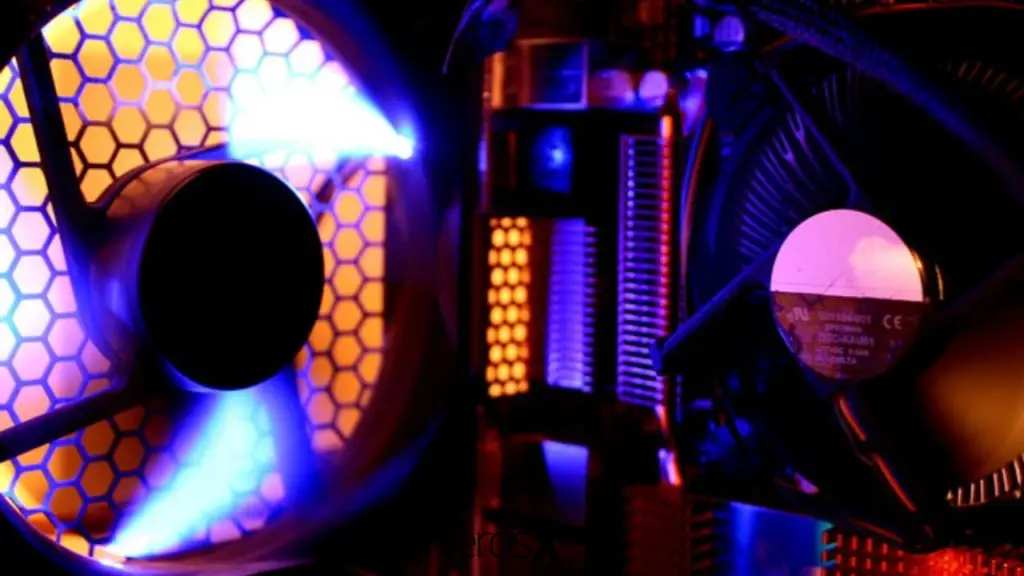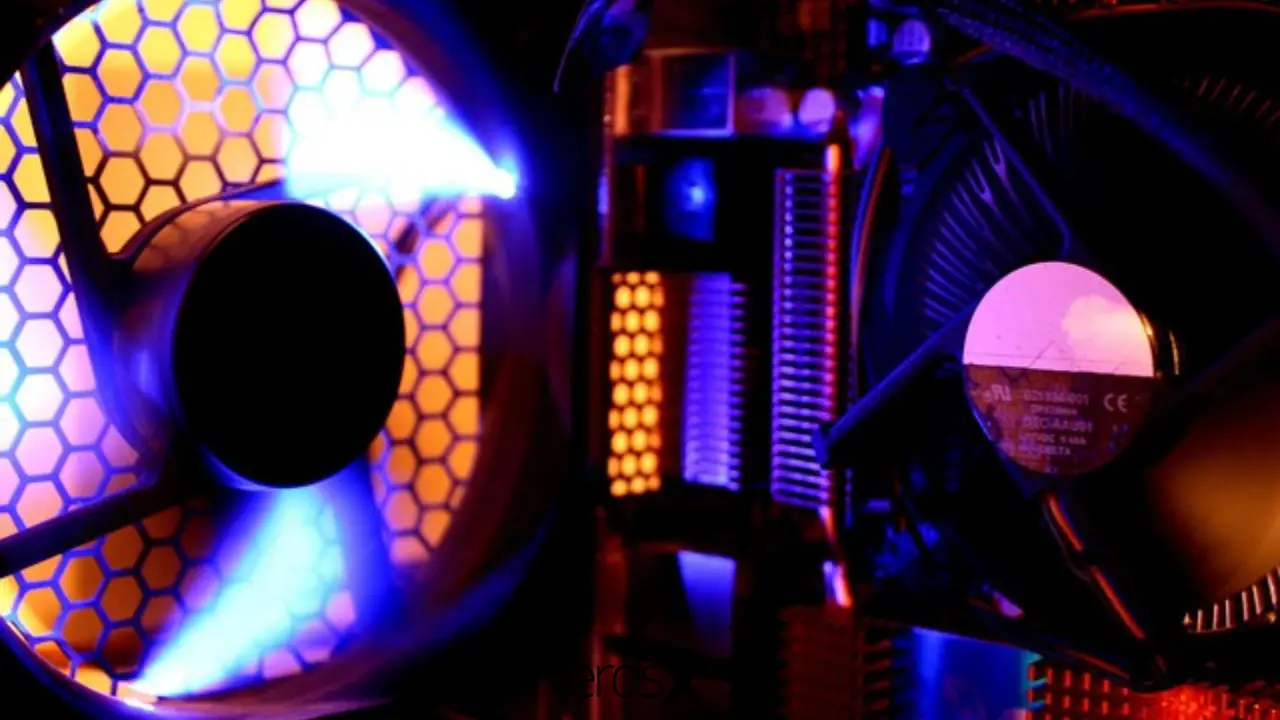Sometimes it’s normal to have a loud computer fan, especially when performing intensive work. When components such as the Central processing unit and GPU are under significant strain, computer fans typically spin faster, resulting in increased noise.
No one appreciates the strange and irritating metallic sounds of a computer’s fans, especially when attempting to concentrate on your work.
While a moderate amount of noise from your computer fan is typical, higher volumes may signal something wrong with your PC.
It can begin as a buzzing, perhaps bearable sound and progress to a continuous, intense sound that will undoubtedly irritate many users.
Is It A Cause For Alarm If My Computer Fan Is Too Loud?
Loud computer and laptop fans might suggest a problem, mainly if the noise lasts for an extended amount of time. The goal of a computer fan is to keep your computer cool, and excessive fan noise indicates that they’re working harder than they should be.
You may begin to suffer a variety of problems if your fans cannot adequately lower the heat levels within your computer. Your CPU will self-regulate its performance to reduce heat production, resulting in a significant dip in speed and performance.
There are a few reasons why computer fans can suddenly become very loud. You may learn more about them in the sections below.

1. Fans That Are Dirty Or Obstructive
Computer fans that are dirty or obstructed can make a lot of noise. That is also the first item to examine if your computer fan creates a lot of noise. When dust or dirt obstructs your fans, the amount of air they circulate reduces significantly, resulting in less effective heat dissipation.
Your motherboard will command the fans to spin faster to reduce the temperature if it detects high temperatures from your CPU and GPU. Therefore, the greater the revolutions per minute (RPM), the more noise is produced.
2. Blocked Vents
Dust can also obstruct air vents, in addition to the fans. That usually means less heat dissipation and, as previously said, higher fan RPM.
The older a computer gets, the more it overheats, especially if you regularly clean the vents. It could also be a result of how you use the computer.�?
3. Faulty Fans
It is natural for fans to fail over a given period. That, in turn, may be due to normal wear and tear.
A loud rattling noise will be created when the fan bearings become loose. That may become intolerable very fast.
4. CPU Overheating
You’ll notice your fans whirling quicker when your computer’s CPU is under intense demand. The volume of noise generated by your laptop will alert you.
Overheating of your CPU is caused by several circumstances. The most prevalent problems are listed below.
1. ventilation issues
2. Obstructed air vents
3. malfunctioning fans,
4. excessive background processes, and dried out thermal paste
5. Outdated Drivers
If you don’t keep your drivers up to date, your hardware will operate inefficiently, which is one of the main reasons for your PC overheating. In such a case, the fans will spin faster, resulting in more noise to counteract the scenario.
1. Invalid BIOS�?
An outdated BIOS might also cause super loud fans. Because your motherboard’s BIOS controls and adjusts the speed of your laptop’s fans, it’s critical to keep it up to date.
2. Malware
Malware is computer software intended to harm and destroy your machine. Computer viruses, worms, Trojan horses, spyware, and other malware may all drain and consume your computer’s resources.
In this instance, hardware such as the CPU and RAM may begin to overwork, putting them on their knees and producing excessive heat. As a result, the fans spin faster, resulting in excessive laptop fan noise.
How To Fix My PC If Fan Is Too loud?
Undoubtedly, a noisy PC fan signals a problem with the computer and might result in various complications. When you hear a buzzing sound that is louder than usual, it implies that the PC fan is working overtime to handle an excessive amount of heat caused by unusual application resource utilization.
When your computer’s fan is noisy for an extended period, your computer’s performance may probably deteriorate, and a slew of problems will emerge as a result.
For example, your computer may operate slower than usual because the fan is running at a higher speed, or it may abruptly run in the black screen of death or blue screen of death.
Therefore, it’s critical to find a solution to the noisy fan.
1. Clean The Vent And The Fan
As previously said, dust can collect in your fan, causing it to malfunction. Thus, cleaning the dust from your computer fan and air vent is a smart idea.
It’s worth mentioning, though, that a computer fan is an inside component of your device, so make sure you’re comfortable opening it up. Do not attempt to open the fan if you are not a computer expert.
However, you can attempt cleaning the fan without opening the computer. Here is how:
1. Unplug all cords and turn off the computer.
2. Angle your computer vents so that you may use a compressed air duster to spray trash out.
3. Blow the dust away using the compressed duster.
Cleaning Fan and Vents by Opening the Computer:�? If you know how to open the computer and unplug various devices from the motherboard, things will be a lot easier. Alternatively, you may hire a computer professional to unlock the device and clear the dust for you.
1. Unplug all cords and turn off the computer.
2. Carefully turn off your PC.
3. Clean the fan and vents dust with a compressed air duster and a clean, soft cloth.
4. Check that all of the components on the motherboard are in the correct place.
5. Connect all cords and turn on the computer to test whether the noisy PC fan continue
2. Ensure That Cool Air Can Flow Into The Fan
When you set your computer on your lap or desktop in a spot that prevents cold air from entering the fan, the computer fan will undoubtedly have to work harder to handle the heat. Therefore, please double-check that your desktop has adequate ventilation.
Furthermore, avoid using your device when the temperature is high due to external causes such as exposing the computer to the sun or working in a hot location such as the kitchen. Additionally, if possible, avoid using the computer for extended periods.
3. Examine How Much Of Your Computer’s Resources Are Being Used By Programs
If you’re unsure whether the PC sound is loud because of particular software, you can examine the resource of consumption.
Through that, you can not only see if some applications are using up your PC’s resources, resulting in overheating and fan noise. But you will also obtain a better understanding of your program resource utilization, such as how much disk space a game takes up.
1. Open the search box and type “Task Manager,” then press “Enter”
2. Check the CPU, Memory, Disk, and Network usages of both foreground and background apps in Task Manager under Processes.
If you notice that one or more programs are using a lot of CPU, disk, or other resources, try turning them off for a while and then see if the computer fan makes a lot of noise and runs at high speed.
If you notice that few programs consume minimal resources, your PC fan may be faulty. Please take it to a technician and inquire whether a fan needs replacement.
However, if you discover that your computer fan is excessively loud and runs at a greater speed as it struggles to perform, you will need to get a PC fan controller, an external fan that helps programs process heat.
Tips On How To Keep Your Computer Fan From Being Too Loud
A computer fan is necessary for the device’s regular operation. If your PC fan develops an issue, such as running at a considerably higher speed or making deafening noises, it may create computer difficulties sooner or later. Therefore, it is vital to protect the computer fan from loud sounds in everyday operations.�?
There are a few things you can do to keep the fan from being too loud:
1. Avoid running too many apps at once: If you don’t require some of the apps, you should switch them off to reduce overheating. It would help to verify the program’s PC resource usage regularly to ensure no unusual resource usage.�?
It’s also possible to keep the fan speed on a PC to a minimum by just running essential apps. As a result, the fan speed increases to handle the heat generated by the running programs while avoiding excessive temperatures created by many processes.
2. To keep your computer safe, use malware and virus software that is dependable and effective: Advanced System care is an excellent alternative in this case because it not only checks for viruses but also cleans up your PC swiftly. Thus, you may download it to your PC and use it as a tool to prevent issues such as a noisy PC fan caused by malware and inefficient resource utilization.

